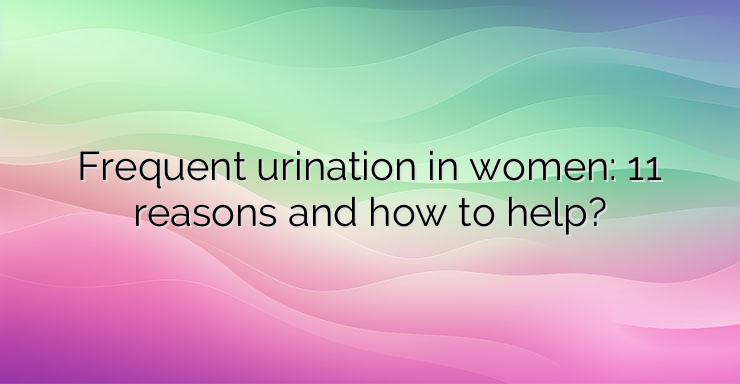Frequent urination can affect women for many reasons. In each person, the frequency of urination varies within different limits, but in general, a frequency of urination of 6 to 8 times a day for one day is considered normal. Although frequent urination and incontinence are very often mentioned together, they must be distinguished. Incontinence means the involuntary release of a small amount of urine. What causes frequent urination in women? Habits, medical conditions, and certain everyday circumstances can lead to this symptom. 1. Too much fluid If you drink more fluid than your body needs, it’s only natural that you urinate more often. The body’s hydration needs vary depending on activity level and environment. But if you urinate more often, you should first rule out increased fluid intake. 2. Alcohol, caffeine and other diuretics It is a well-known fact that diuretics make us urinate more often than normal. Alcohol and alcoholic beverages (beer, wine) as well as caffeinated beverages are known natural diuretics. Artificial sweeteners also have a diuretic effect. Acidic foods and drinks, as well as citrus fruits or tomatoes, also act as diuretics. If you consume some of the listed more often than usual, it is normal to urinate more often. In addition, some drugs used to treat arterial hypertension have diuretic side effects. 3. Urinary tract infection Most women have at least one urinary tract infection at some point in their lives. Genitourinary tract infections occur when bacteria colonize parts of the urinary system such as the bladder, urethra, and kidneys. In addition to frequent urination, signs of infection include burning and pain during urination, pressure or discomfort in the back or around the pelvis, and fever. 4. Vaginitis There are several causes of this common condition – in most cases, the cause is some type of infection. Along with genital pain and discomfort, frequent urination can be another telltale sign of vaginitis. Other symptoms include burning or itching, and foul-smelling vaginal discharge. 5. Overactive bladder A condition in which the bladder empties more often than necessary. Frequent urination is accompanied by sudden uncontrollable urges to urinate. The condition is more common in older people. 6. Interstitial cystitis Occurs when the muscles in and around the bladder become irritated. The exact reason for this is not fully understood. The condition affects the female gender more often. 7. Bladder Stones Like kidney stones, bladder stones occur when minerals in the urine increase in concentration. Other symptoms indicating the presence of stones in the bladder are pain and discomfort in the lower abdomen, as well as burning during urination. 8. Pregnancy The expanding uterus puts pressure on the bladder,which in turn causes the bladder to empty more often. This is not unusual for pregnancy. 9. Stress and anxiety Frequent urination can sometimes be a response to feeling anxious or nervous. Actually, it is not clear why, but it may be a natural reaction of the body to the unfavorable environment outside your body. 10. Low estrogen levels Estrogen is a female sex hormone, but it also plays a role in maintaining the walls of the bladder. This means that if your estrogen levels are low (during menopause) you may very well report frequent urination as your bladder feels tight. 11. Diabetes Frequent urination can be a sign of both type 1 and type 2 diabetes. With diabetes, your body cannot regulate blood sugar levels properly. As a result, your body tries to get rid of it, which explains why frequent urination is an early sign of the disease.


Leave a Reply